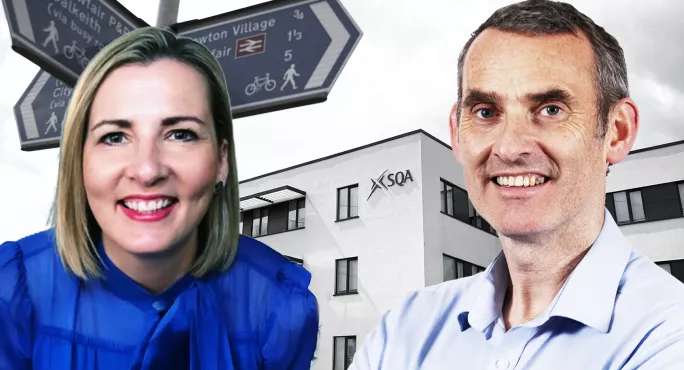
SQA reveals names of CEO and chief examining officer as roles are split

The Scottish Qualifications Authority (SQA) has split the roles of chief executive and chief examining officer - and today revealed who would be filling them.
The announcement of the new structure follows the departure of former CEO Fiona Robertson last week.
The new interim CEO is John Booth, who has been the SQAŌĆÖs communications director since June 2021. An open recruitment process is underway to decide on the longer-term chief executive, who is expected to take on the role around the time that the SQA becomes the new national body Qualifications Scotland in the autumn.
The new chief examining officer is Donna Stewart, a former secondary depute headteacher who has been SQA interim director of qualifications since October 2024.
- Related: SQA chair sees much to be proud of - but also much to do
- Background: ScotlandŌĆÖs chief examiner and SQA CEO to step down
- Context: SQA should cease to exist in 2025 - but what will change?
Other high-profile SQA appointments announced today include the expansion of Jean BlairŌĆÖs role: currently director of operations, she becomes chief operating officer.
George Brown, head of accreditation since 2001, will assume the role of chief regulator, independently managing all accreditation duties and maintaining high standards of quality and fairness.
The SQA is also poised to appoint a new ŌĆ£senior adviserŌĆØ - a current or former headteacher - who will play a crucial role in helping to establish a new ŌĆ£schools unitŌĆØ within the national awarding body.
A week ago today, SQA chair Shirley Rogers told the Scottish ParliamentŌĆÖs Education, Children and Young People Committee of her hopes for the new CEO.
She said: ŌĆ£I am hopeful - I really am - that there is, from someone out there who is watching this committee meeting, at least one belting application to be our next chief executive.ŌĆØ
ŌĆśStability, continuity and focusŌĆÖ
Today, Ms Rogers said the new structure was designed to provide ŌĆ£stability, continuity and focusŌĆØ while the body seeks ŌĆ£the individual who can lead us on a permanent basis to establish Qualifications ScotlandŌĆØ.
She said: ŌĆ£I would encourage candidates with the experience and skills to excel as our new permanent chief executive to apply for the role. It is a rare opportunity to establish and lead a new body that will bring positive changes for learners, educators and the wider education community, as well as supporting industry and the wider economy.ŌĆØ
Interim chief executive John Booth said he was ŌĆ£privileged and proudŌĆØ to take on the role, adding he was ŌĆ£determined to reset relationships and win back the trust of learners, teachers and parentsŌĆØ.
He said that engaging with them would be ŌĆ£a key priorityŌĆØ and promised the new leadership team would ŌĆ£serve with humilityŌĆØ and learn from the past ŌĆ£by being more open to criticism, challenge and scrutinyŌĆØ.
However, he also wanted to ŌĆ£look resolutely forwardŌĆØ and not ŌĆ£dwell on what has gone beforeŌĆØ.
Mr Booth added: ŌĆ£The replacement of SQA with Qualifications Scotland provides an unprecedented opportunity for a reset and a fresh start, while continuing to maintain standards and the credibility of our qualifications.ŌĆØ
Bringing SQA closer to teachers
Chief examining officer Donna Stewart said she was looking forward to working with the new senior adviser to establish the ŌĆ£schools unitŌĆØ and ŌĆ£bring SQA closer to teachers and the wider professionŌĆØ - as well as ŌĆ£learners and communitiesŌĆØ.
Last week, she told the Scottish ParliamentŌĆÖs Education, Children and Young People Committee that the unit would help teachers engage with the SQA, while helping the SQA understand how it could better support schools.
ŌĆ£Together we can and will achieve our shared ambition of an improved qualifications and assessment system that enables every learner, supports every educator and delivers for Scotland.ŌĆØ
Education secretary Jenny Gilruth said she was looking forward to working with the new team and implementing the ŌĆ£plans for transformational change in our education systemŌĆØ.
The SQA has come under huge pressure in recent times, including over the cancellation of the exams during Covid and the decision to adjust studentsŌĆÖ grades in 2020 based on the past performance of schools. The move resulted in students protesting over results that were far lower than their anticipated grades and a government U-turn.
More recently, the fall in the Higher history pass rate in 2024 and dissatisfaction over the SQAŌĆÖs handling of the situation have led to calls for an independent review of what went wrong - as well as reopening the debate about whether Scotland needs a separate qualifications watchdog.
For the latest in Scottish education delivered directly to your inbox, sign up for TesŌĆÖ The Week in Scotland newsletter
You need a Tes subscription to read this article
Subscribe now to read this article and get other subscriber-only content:
- Unlimited access to all Tes magazine content
- Exclusive subscriber-only stories
- Award-winning email newsletters
- Unlimited access to all Tes magazine content
- Exclusive subscriber-only stories
- Award-winning email newsletters
You need a subscription to read this article
Subscribe now to read this article and get other subscriber-only content, including:
- Unlimited access to all Tes magazine content
- Exclusive subscriber-only stories
- Award-winning email newsletters
- Unlimited access to all Tes magazine content
- Exclusive subscriber-only stories
- Award-winning email newsletters
topics in this article



